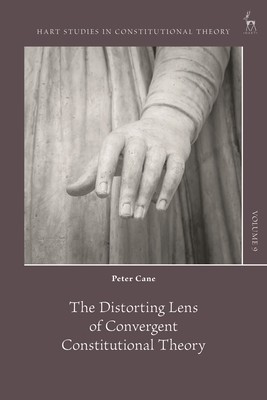
- We will send in 10–14 business days.
- Author: Peter Cane
- Publisher: Hart Publishing
- ISBN-10: 1509988467
- ISBN-13: 9781509988464
- Format: 15.6 x 23.4 x 1 cm, kieti viršeliai
- Language: English
- SAVE -10% with code: EXTRA
The Distorting Lens of Convergent Constitutional Theory (e-book) (used book) | bookbook.eu
Reviews
Description
This book challenges the near-universal acceptance of a US-style, Western constitutional paradigm as the best basis for comparative constitutional studies. It does so on three main grounds: anachronism, 'othering' and cultural specificity.
Main pillars of 'convergent constitutional theory' are rooted in the revolutionary, late-eighteenth century - a lost world; constitutional arrangements that deviate from the paradigm are often branded as 'outliers' or even as not constitutional at all; and the foundations of the paradigm in liberal democracy give no space for other forms of constitutionalism. Whatever the attractions of convergent theory as a normative ideal of good government, for the purposes of understanding, analysing and explaining constitutional systems it is far from ideal. This book discusses and questions: convergent theory's weddedness to writing as the technology of constitution-making; its image of a constitution as fundamental law; its idea that a constitution expresses the 'sovereignty of the people'; its use of tripartite separation of powers as the basic principle of institutional design; its relative neglect of administrative law; its association of 'rights' with judicially enforceable bills of rights; and its obsession with a vaguely specified concept of 'democracy'. It makes suggestions for alternative, preferable methods of understanding, analysing and explaining constitutions, and governmental and constitutional systems.EXTRA 10 % discount with code: EXTRA
The promotion ends in 23d.18:09:35
The discount code is valid when purchasing from 10 €. Discounts do not stack.
- Author: Peter Cane
- Publisher: Hart Publishing
- ISBN-10: 1509988467
- ISBN-13: 9781509988464
- Format: 15.6 x 23.4 x 1 cm, kieti viršeliai
- Language: English English
This book challenges the near-universal acceptance of a US-style, Western constitutional paradigm as the best basis for comparative constitutional studies. It does so on three main grounds: anachronism, 'othering' and cultural specificity.
Main pillars of 'convergent constitutional theory' are rooted in the revolutionary, late-eighteenth century - a lost world; constitutional arrangements that deviate from the paradigm are often branded as 'outliers' or even as not constitutional at all; and the foundations of the paradigm in liberal democracy give no space for other forms of constitutionalism. Whatever the attractions of convergent theory as a normative ideal of good government, for the purposes of understanding, analysing and explaining constitutional systems it is far from ideal. This book discusses and questions: convergent theory's weddedness to writing as the technology of constitution-making; its image of a constitution as fundamental law; its idea that a constitution expresses the 'sovereignty of the people'; its use of tripartite separation of powers as the basic principle of institutional design; its relative neglect of administrative law; its association of 'rights' with judicially enforceable bills of rights; and its obsession with a vaguely specified concept of 'democracy'. It makes suggestions for alternative, preferable methods of understanding, analysing and explaining constitutions, and governmental and constitutional systems.

Reviews